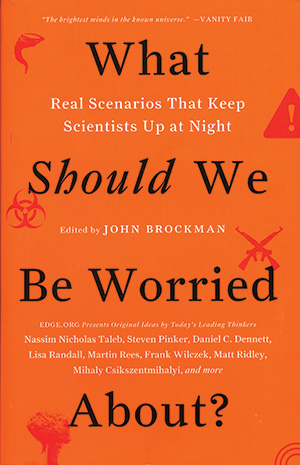The title of the new compilation volume What Should We Be Worried About? cries out for a reader’s response: “What shouldn’t we be worried about?” The book is a project of the website Edge (nee the Reality Club), which annually surveys scientists, philosophers and assorted deep thinkers about speculative topics. As any born worrier might suspect, there is no end of things to worry about, which makes this a good bedside title for insomniacs.
The more than 150 bite-size entries in What Should We Be Worried About? run the gamut from the obvious (climate change, duh) to field-specific fretting (scientists apparently worry a whole lot about finding new big-budget experiments to pursue), from familiar hand-wringing about social media (we’re too connected; no, we’re not connected enough) to both fear of and excitement about artificial intelligence.
Steven Pinker’s mini-essay about the “Real Risk Factors for War” seems especially prescient in its analysis of narcissistic leaders embarking on “imperial adventures,” even if he doesn’t cite Vladimir Putin by name. Equally troubling in light of the failure of government to regulate and Wall Street to atone is psychologist Randolph Nesse’s warning about the “hidden fragility of complex systems,” especially in the machinery of global finances.
Columnist and author of To Save Everything, Click Here, Evgeny Morozov skewers Silicon Valley hubris by noting that so-called “smart solutions don’t translate into smart problem solvers.”
Given the somewhat elitist nature of the project, many of the scientists in the anthology worry about anti-scientific thinking, mass stupidity and inadequate science education—or what psychologist Douglas T. Kenrick terms the “looming idiocracy.” He doesn’t mention the Tea Party by name, but the inference is worrisome.
As a countermeasure, several contributors take the “meta” route and discuss the possibilities and limitations of worry and anxiety as human traits. Stanford neuroscientist Brian Knutson thinks that people waste valuable time worrying about the wrong things. Psychiatrist Joel Gold calls worry a “corrosive” force that renders us passive and helpless.
To leaven all the worst-case scenarios, Monty Python original and director Terry Gilliam confesses, “I’ve given up worrying. I merely float on a tsunami of acceptance of anything life throws at me É and marvel stupidly.” Or, as Mad magazine’s Alfred E. Neuman once quipped, “What, me worry?”
What Should We Be Worried About?: Real Scenarios That Keep Scientists Up at Night
Edited by John Brockman
Harper Perennial, paper, $15.99



